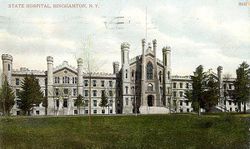Binghamton State Hospital
| Binghamton State Hospital | |
|---|---|
 | |
| Opened | 1858 |
| Closed | 1993 |
| Current Status | Preserved |
| Building Style | Cottage Plan |
| Architect(s) | Isaac G. Perry |
| Location | Binghamton, NY |
| Architecture Style | Gothic Revival |
| Alternate Names |
|
History
Built in 1858, the castle originally served as the country's first inebriate asylum. Founder J. Edward Turner belonged to a school of thought that alcoholism wasn't just a vice, but could be cured medically. The well-lit rooms and extensive grounds are an important marker in New York State's view of addiction. The asylum was the first of its kind in the country, but only served its original purpose for 15 years, at which point Turner's inebriate asylum was converted into a hospital for the chronically insane. The asylum faced financial woes for a decade after a great fire broke out in March 1870. Gov. Lucius Robinson deemed it a “complete failure” in 1879, suggesting that the asylum be closed down and renovated to house the insane. In 1881, its doors were reopened as the Binghamton Asylum for the Chronic Insane, later renamed the Binghamton State Hospital. Hundreds of patients were transferred to Binghamton from Utica, Poughkeepsie and Middletown; those patients lived, suffered and died in the palatial asylum. Treatment methods only worsened with the turn of the century.
The hospital fell into steep decline in the late 1900s with the introduction of modern medicinal treatments, until it finally closed its doors in 1993. The building was declared a National Historic Landmark in 1997.
Images of Binghamton State Hospital
Main Image Gallery: Binghamton State Hospital
Books
- Drunkard's Refuge: The Lessons of the New York State Inebriate Asylum, by John W. Crowley and William L. White


